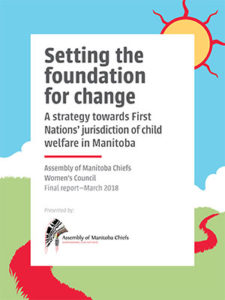
First Nations Family Advocate Office
The Assembly of Manitoba Chiefs opened the First Nations Family Advocate Office (FNFAO) on June 1, 2015. The office opened in ceremony with the office gifted the name “Abinoojiyak Bigiiwewag,” which translates to “Our Children are Coming Home.”
In Manitoba, there are approximately 12,000 children in Child and Family Services (CFS) care and 90 per cent of them are Indigenous. These staggering numbers today are the result of Indian Residential Schools and the 60s Scoop, both of which destroyed individuals, families and communities.
With the number of Indigenous children in CFS care reaching crisis levels, First Nations families and children involved with the CFS system wanted solutions. Through community engagement events held in Winnipeg and Thompson, Manitoba, in May 2014, several hundred community members shared their stories about the CFS system. We heard about the challenges they faced while navigating the CFS system and the failures of the CFS system to operate in a fair and just manner.
From information gathered during the community engagement sessions, the Assembly of Manitoba Chiefs published the Bringing Our Children Home Report (BOCH). The BOCH Report offered ten recommendations that would immediately address many of the issues and concerns identified during community engagement sessions.
One of those recommendations was the creation of the FNFAO; this office is an added mechanism to implement further BOCH Report recommendations.
Since opening its doors, the FNFAO has completed intake for over 800 families fighting to have their children in CFS care returned to their homes or home communities. More families, parents and grandparents seek the services of the FNFAO each day and demand for services is continually growing.
The FNFAO is unique because our mandate is from Manitoba Chiefs, our advocacy work supports the whole family and we advocate for First Nation-led solutions to address the CFS crisis in Manitoba. We work outside of the current CFS system, understanding that our work cannot empower a provincial system that has clearly failed First Nation children, families and communities.

Contact:
2nd Floor – 286 Smith Street
Winnipeg, Manitoba
204-987-4592 (main line)
1-855.996.9989 (toll free)
http://firstnationsfamilyadvocate.com

Setting the foundation for change
Setting the Foundation for Change
This report is the strategy for the Assembly of Manitoba Chiefs on child welfare reform. It contains the findings from the Assembly of Manitoba Chiefs Women’s Council Strategic Planning Session on child and family welfare held on March 9 and 10, 2018. The Women’s Council oversees the child and family welfare file at the Assembly of Manitoba Chiefs and developed this foundational strategy to assist in navigating the current Manitoba Child and Family Services landscape and to guide further work on the Assembly of Manitoba Chiefs and Government of Canada Memorandum of Understanding on child welfare reform.

Memorandum of Understanding Between AMC and Canada
AMC asserts that the Anishinaabeg, Anishinininwak, Dakota Oyate, Denesuline, Nehethwuk I Inninwak and other First Nation peoples in Manitoba possess inherent Aboriginal and Treaty rights including the inherent jurisdiction over the well-being of their families and children. The Dakota Oyate people have a special relationship with Canada which is grounded in the unique history of their people and the Crown.

Keewaywin: Our Way Home
Manitoba First Nations Engagement on First Nations Child and Family Services
Keewaywin: Our Way Home, Manitoba First Nations Engagement on First Nations Child and Family Services contains the main findings and recommendations from engagement sessions and meetings with 20 First Nations in Manitoba.
Responding to the highest child apprehension rate in Canada, Manitoba Chiefs-in-Assembly supported a resolution to hold a Special Chiefs Assembly and open forums for concerned First Nation citizens on the topic of First Nation families and child welfare.
The report and its 10 recommendations revealed the current child welfare system in Manitoba is simply an extension of cultural genocide practices found in the residential school system and 60s Scoop. Following review of the report, Manitoba Chiefs-in-Assembly directed the Assembly of Manitoba Chiefs to develop an action plan to implement report recommendations.
Jordan’s Principle is a child-first and needs-based principle that applies equally to all First Nations children resident on or off reserve. It ensures there is no denial or delay for First Nations children in receiving essential public services that are available to all other children by having the government department of first contact pay for the service.


Bringing Our Children Home
In 2014, the Assembly of Manitoba Chiefs explored the child welfare system in Manitoba from the perspective of the people who must deal with the system directly; including children (now adults), parents, grandparents, workers and support service organizations that are established to help the people.
The result of this two-day Open Citizens Forum was the creation of the Bringing Our Children Home report with 10 recommendations that is based on First Nations traditional parenting practices, the protection of cultural identity and prevention rather than apprehension.

Bringing Our Children Home Act
The Assembly of Manitoba Chiefs has been moving towards the restoration of First Nations jurisdiction over children and families through the draft Bringing Our Children Home Act. The Bringing Our Children Home Act is a Manitoba-specific federal legislation that is guided through ceremony by First Nations citizens, Elders, knowledge keepers, youth and leadership.
In October 2018, the AMC Chiefs-in-Assembly passed a resolution to support and endorsed the draft Manitoba-specific federal legislation Bringing Our Children Home Act. In addition, First Nations engagement has taken place in tandem to develop template laws regarding well-being of our children and families which respects the five Nations/language groups in Manitoba based on the original First Nations customs, practices and traditions.